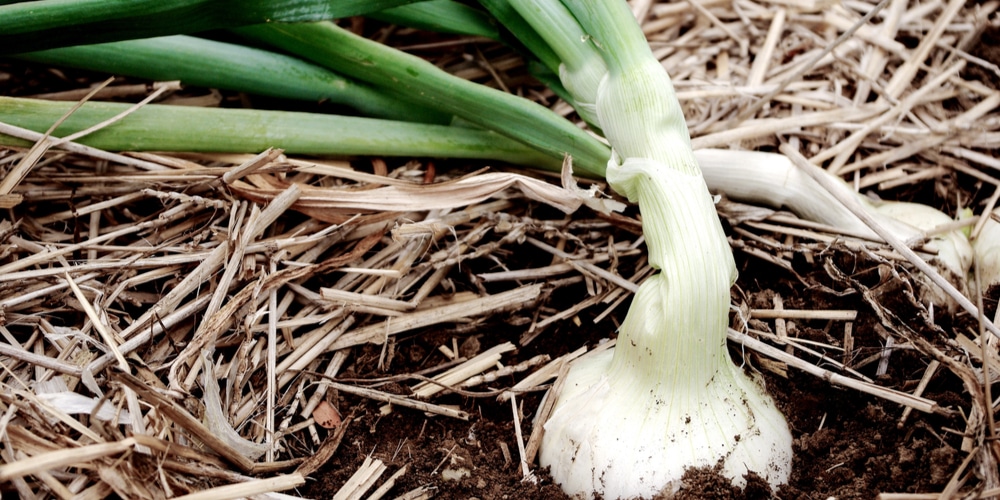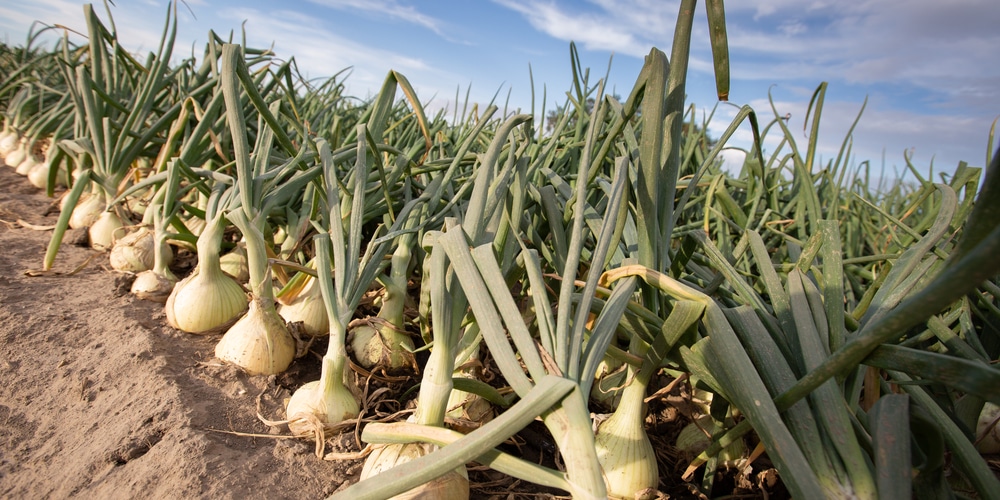Growing vegetables in your garden can be satisfying and rewarding when you do it the right way. However, sometimes things don’t go as they should. Indeed, taking care of plants (and veggies) requires more than watering them once or twice a week. You may be wondering why your onion leaves are bent over?
For instance, you should keep your plants under control and take measures if they don’t seem to grow the way they should.
Onions are relatively easy to grow crops that thrive in the cold season and produce harvests in the fall. While they usually don’t present many problems, you may have to check on them to ensure they thrive.
For instance, what does it mean when onion leaves are bent over? Why does such a condition manifest, and what can you do to fix it? Keep reading to learn everything you need to know on the subject!
Why Do Onion Leaves Fall Over?
When your onions are ready, the plant’s leaves will fall over because they spent all their energy growing the bulbs. Depending on when you plant them and what variety you pick, your onions will be ready at different times. And when your onion leaves fall over because they have reached maturity, you should not be concerned about it.
However, if your onions aren’t mature, onion leaves might start drooping due to lack of water, attacks from pests and diseases, and inadequate growing conditions. Jump to the following sections to learn more about preventing (or solving) each situation.
Inadequate growing conditions
Growing your onions in inadequate conditions may cause your plant’s leaves to fall over. Remember not to plant your onions deeper than one inch in the ground to allow enough space to grow and enough soil to anchor the plant. Your bulbs will emerge from the ground as they start maturing.
Lack Of Water
While onions are not heavy feeders, if you live in a dry region, you may experience some issues with watering. Lack of water might cause your bulbs to mature before their time, which will cause their leaves to drop prematurely.
Don’t forget to plant your onions inadequate soil (fertile and well-draining) and consider adding a layer of mulch around them to increase water retention and improve drainage.
Doing so will also increase the soil’s nutrient content. Additionally, it will contribute to keeping weeds at bay, which always comes in handy.
Remember that you’ll have to reduce the watering frequency in the winter to avoid rotting.
Attacks from Pests
Some pests might cause drooping to your plant. Some of the most common are maggots. These insects feed on the roots of onions and lay their eggs on the stems of your plants. If you notice your bulbs turning yellow and their leaves wilting, you might be dealing with maggots.
Make sure you take immediate action to contain the issue and reduce the risk of an infestation. Use suitable pesticides to get rid of the problem, better if organic. Also, remove all of the severely infested plants.
Use row covers or sticky cards to prevent these insects from getting to your veggies. Consider applying both, especially if you live in a hot and humid region.
Diseases
Some diseases might cause your onions to wilt or droop. They are usually a result of fungal infections. You may see some yellow areas on the leaves of your plants, which means they suffer from downy mildew. The condition is usually hard to treat.
However, you can try preventing it. Avoid overwatering your plants and make sure your soil drains well. Alternatively, consider planting resistant onion varieties.
Why Do Onion Tops Fall Over?

If you notice your onion leaves’ tops falling over, don’t worry: it is a sign your bulbs are ready to harvest. Under such conditions, your onions will stop growing.
You should dig out your onions and store them properly when that happens to enjoy them at their best flavor and increase their shelf-life. Do not leave your onions in the ground for too long: they may rot and become inedible.
Onion Leaves Bent Over: Final thoughts
Don’t forget that you should store your onions in a cool place, but avoid freezing them. Sometimes, onions might still sprout even when not in the ground. If that happens to you, that’s good news: you can plant them again and get onions!
Related article: Fall Planting Onions
